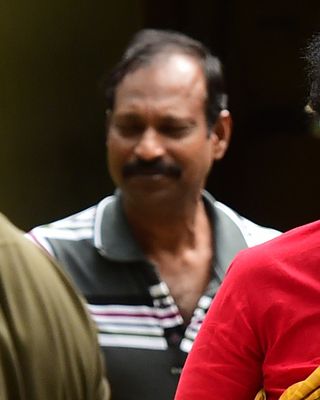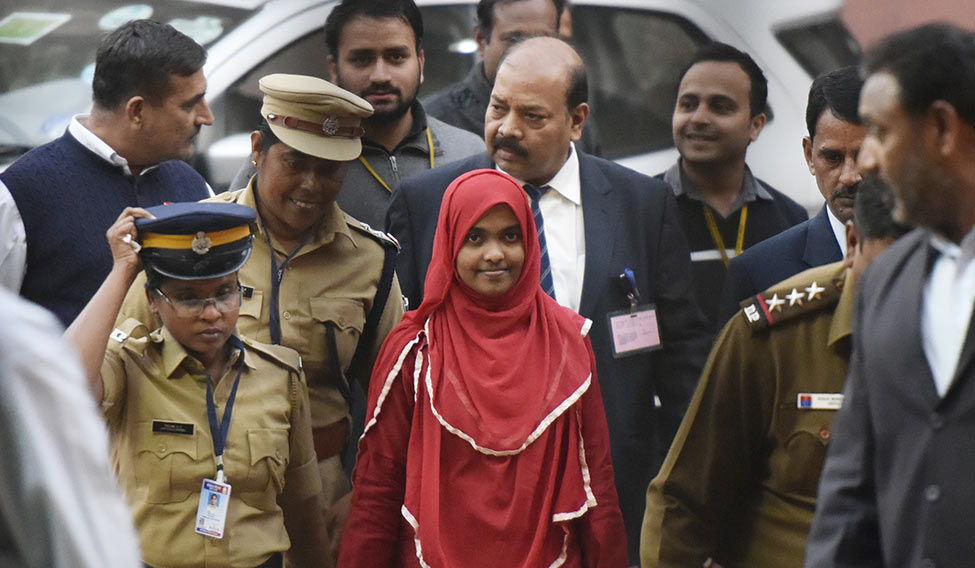Before a 25-year-old girl’s personal choices became a national story, there lived a family on the banks of Vembanadu Lake in a picturesque village called T.V. Puram in Kerala’s Kottayam district. Akhila, who now calls herself Hadiya, grew up here under the care of her ex-serviceman father, K.M. Asokan, and her mother, Ponnamma, a housewife. Asokan was an atheist and Ponnamma, a staunch believer. Akhila grew up amidst constant clashes of religiosity and atheism.
Her friends and teachers remember Akhila as a quiet and reserved girl. In 2010, she went to study homoeopathy at Sivaraj Homoeopathic Medical College in Salem, Tamil Nadu. There were four other students from Kerala in her class and one of them was a Muslim. Akhila got close to the Muslim girl, Jaseena, and her sister, who also studied in the same college. They were from Malappuram, the only Muslim-majority district in Kerala.
“Having brought up by her father in a rigid secular framework, Akhila was surprised by the religiosity of the two sisters,’’ said one of her aunts. She wanted to know more about Islam, and the two sisters gave her books on Islam. They also introduced her to their father, Parayil Aboobacker, who has studied his religion quite well.
Being a proud secularist and a supporter of the Communist Party of India, Asokan was happy to hear about his daughter’s interest in Islam. Aboobacker said he had warned Asokan about how Akhila was changing. “But he was very casual about it,’’ he said. Akhila stopped talking to Aboobacker after he asked her to learn more about her own religion first. But her interest in Islam grew steadily and she even got an affidavit prepared saying that she was willingly converting to Islam.
“She even wanted her parents to convert. She said she would commit suicide if they refused,’’ said her aunt. Her mother fainted on hearing this. Even Asokan was shocked. Akhila soon left home and sought Jaseena’s help to go to Mangalore to meet members of some Islamist groups.
“She knew nothing about those people,” said Aboobacker. “So I promised to help her and took her to two conversion centres approved by the government. But they turned down her request as they needed the approval of her parents.” Aboobacker and Akhila then approached Sathya Sarani, a “religious education centre’’ in Malappuram, run by the Popular Front of India (PFI), the latest avatar of the banned National Development Front. But Sathya Sarani, too, did not take her in.
 Woes of virtue: Many people blame Asokan’s secularist ideals for his troubles | Rijo Joseph
Woes of virtue: Many people blame Asokan’s secularist ideals for his troubles | Rijo Joseph
“I put her in a bus to her college and shared the details with her parents,’’ said Aboobacker. “But from the bus she called up Sathya Sarani and this time they took her in. Nobody knew where she was and I was under suspicion,’’ he said. Aboobacker had to spend several days in police custody until Akhila appeared before the Kerala High Court after Asokan filed a writ of habeas corpus. Aboobacker said Akhila later apologised to him. “But, by then, I had become the villain of the story,’’ he said.
Akhila appeared before the court on January 19, 2016, along with A.S. Zainaba, president of the National Women’s Front, an organisation closely associated with the PFI. After she told the court about her intention to convert to Islam, she was allowed to attend a course on Islam at Sathya Sarani and to stay with Zainaba. “As a true Muslim, it is my duty to help anyone who approaches me to know more about Islam,’’ said Zainaba.
Once the course at Sathya Sarani was over, Zainaba took Akhila, who had by then assumed the name Hadiya, to her home. “She was so simple, but her convictions were strong,’’ said Zainaba. When asked what must have attracted her to Islam, she said Hadiya found her Muslim friends to be more composed and confident than others during critical situations like examinations. “She may have realised that they drew their strength from the faith,’’ she said.
During this time, Hadiya was constantly in touch with Asokan whom she calls achai. Zainaba called Asokan a “nice human being’’ who loved his daughter more than anything else. “Hadiya had great respect for her father,” she said.
Zainaba said Hadiya went back to college, but could not continue her studies because of the hostile reception she got from her friends and teachers. “Hence we started looking for a groom for her and placed an advertisement in a marriage portal called ‘Way to Nikah’.”
When Hadiya shared the news with Asokan, he got angry. It was the time when reports started appearing about young Muslim couples—some of them recent converts—leaving for Syria to join Islamic State. Asokan filed another habeas corpus petition alleging that there was a move to take his daughter out of India. Although the court initially sent Hadiya to a hostel, she was later allowed to go with Zainaba.
Hadiya then got a proposal for marriage from Shafin Jahan, a native of Kollam district, who was then working in Oman. “I really liked her at the first sight. She was the girl of my dreams,’’ Shafin told THE WEEK. When asked what attracted him the most, he said Hadiya had “too many qualities’’ to pick one. On being pressed more, he said, “Hadiya has a mind of her own. I also liked her simplicity and her concern for others.’’
Shafin and Hadiya got married at Zainaba’s house on December 19 in the presence of his sister. Shafin’s parents did not attend the marriage. The same day, the court passed an order asking Hadiya to complete her internship and agreed to Asokan’s offer to pay for the expenses. Two days later, the couple appeared before the court and announced their marriage. Unhappy about the marriage, which was solemnised while the case was being considered, the court sent Hadiya to the hostel again, and barred Shafin from having any contact with her. The court observed that not even an indication of the marriage was given by Hadiya’s lawyer on the 19th although the marriage was solemnised on the same day. On May 24, 2017, the court nullified the marriage and gave Hadiya’s custody to her father. The court observed that the marriage was performed to circumvent its jurisdiction and the locus standi of the parents. But Shafin said that was not the case.
“Our marriage was a proper arranged marriage. Allegations about extremist links are part of a larger conspiracy,’’ said Shafin. He said he was part of the Campus Front, the students’ wing of the PFI, and that he ran the Facebook page of the PFI’s political arm, the SDPI (Social Democratic Party of India). “But what is illegal about being part of a registered political party,’’ he asked.
According to him, the separation has only deepened his love for Hadiya. “Actually, we fell in love during this separation. I firmly believe that we will be together soon,’’ he told THE WEEK before leaving for Delhi for the hearing in the Supreme Court. The court on November 27 allowed Hadiya to go to her college in Salem and complete her internship. It will take up the issue again next month.
Major political parties in Kerala barring the BJP kept mum on the issue, keeping in mind the minority vote bank. The SDPI, with its aggressive posturing on behalf of Hadiya and Shafin, has gained the most from the controversy. “It is absolutely wrong to call this ‘love jihad’ as Hadiya had converted long before she met Shafin. Hadiya has strong convictions and a mind of her own,’’ said Nasaruddeen Elamaram, state president of the PFI. He said Hadiya’s conversion was part of a worldwide trend of more and more people embracing Islam. “Hadiya was initially very critical of Islam as she thought it was anti-woman and orthodox. But she changed her mind as she learnt more about it,’’ said Elamaram.
For six months, Hadiya had been staying with her parents against her wishes. While human rights activists criticised Asokan, people in his village have been largely sympathetic to him. “Asokan had no problem with Akhila’s conversion. But he could not accept her decision to marry someone with extremist connections,’’ said Samji T.V. Puram, a writer.
A leader of the Sree Narayana Dharma Paripalana Yogam (SNDP), an organisation of the Ezhava community to which Asokan belongs, blamed his secularist principles for his ordeal. “He used to ridicule Hindu customs and would even say that all temples must be demolished to build factories. He never participated in community activities.” But now Asokan has changed, his friends say. A leader of the Bharatiya Dharma Jana Sena (BDJS), a political party closely associated with the SNDP, and a BJP ally, said the CPI ditched Asokan as it did not want to upset the minority vote bank. “Being all alone, Asokan came to us seeking help,’’ he said.
Some of Asokan’s family members said his atheist principles caused all the trouble. “My brother used to ridicule everything religious. He used to get upset whenever his wife took Akhila to temples. Akhila grew up in the middle of all that,’’ said Asokan’s sister.
Aboobacker also found fault with Asokan’s principles. “It is the duty of the parents to inculcate in their children their own culture and traditions. Asokan failed to do that,’’ he said. “I feel bad that a very personal case has been blown out of proportion and is hurting our secular fabric. I am a practising Muslim. But I have no qualms in saying that those who are trying to politicise Islam are harming both Islam and India.”








